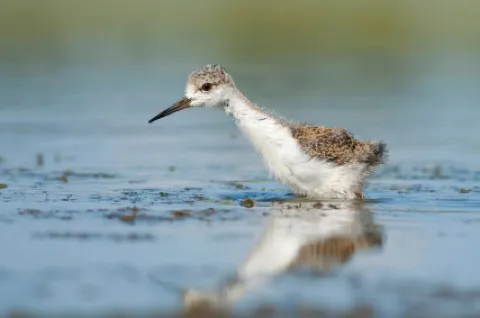A rare Mediterranean wading bird which has not bred successfully in the UK for 27 years has hatched its first chicks on RSPB reserves in Kent and West Sussex in south-east England today.
The first chick came out at RSPB Cliffe Pools on the North Kent Marshes early this morning, and a second hatched mid-morning at RSPB Medmerry near Chichester.
Black-winged stilts are large black-and-white waders with long reddish-pink legs. They nest in wetland and feed on insects which they pick from the surface of the water or forage for in shallow mud. Stilt pairs were discovered on the reserves last month, and the RSPB organised a 24-hour watch on the nests with the help of volunteers.
Now, chicks from the nests are hatching in the first successful breeding attempt since 1987. 'It’s very exciting that the chicks are beginning to hatch,' said RSPB Cliffe Pools warden Andy Daw. He added: 'We managed to protect the eggs, but there are still challenges ahead because the chicks will become more vulnerable to predation.'

It is thought that a dry spell in southern Spain has displaced the birds to southern Britain, and a changing climate may bring these birds more regularly in future: Cliffe Pools has ten percent of the UK’s saline lagoons, a very rare habitat which gives the black-winged stilts what they need to breed and raise chicks. The stilts breeding at Medmerry is a tribute to the wetland conditions on the reserve. It is the largest open-coast managed-realignment scheme in Europe, and the RSPB’s newest reserve.
Bird enthusaists wanting to view the newborns can visit, but the chicks may be hard to spot. 'At the moment they are on an island but the water is too deep for feeding,’ says Andy, ‘so they will probably swim the chicks across so they can feed in shallower waters around the coastguard flats, which may make them a bit more difficult to see.'
To find out more about the RSPB, go to www.rspb.org.uk
